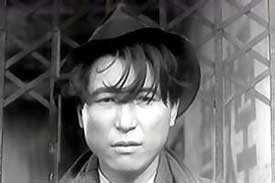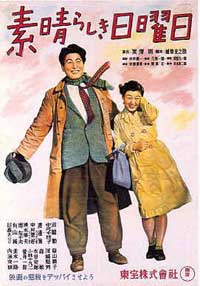Tokyo is in shambles after the war. Poverty is everywhere. In One Wonderful Sunday (Subarashiki nichiyobi, 1947), a young man & woman with only thirty-five yen between them can't afford a date or anything.
At first Yuzo (Isao Numasaki) is crabby, but Masako (Chieko Nakakita) insists it's a beautiful Sunday, & they can find plenty of free entertainment around the city.
 So they play house in a display model home, pretending they can afford such a house. Still, Yuzo has trouble maintaining the pose, & tells Masako, "You're too romantic. We're poor people. Dreams can't make you full." So they play house in a display model home, pretending they can afford such a house. Still, Yuzo has trouble maintaining the pose, & tells Masako, "You're too romantic. We're poor people. Dreams can't make you full."
They learn about a cheap apartment. Since they want to get married & set up housekeepihng together, they go to check it out. They find it a to be a dark dirty ill-kept room no one with a spark of human hope could live in.
After getting gloomy about that, they cheer up when he begins to play baseball with little street urchins, then take a trip to the zoo.
They go through phases of depression & forced pretences of happiness. They find little rewards that nearly uplift them, & disappointments that nearly destroy their will to carry on. Mostly the film tries to find hope amidst postwar deprivations.
Though well acted & only occasionally outright dull, I never honestly liked these two people. Their suffering & their pleasures alike did not seem real or important.
In Kurosawa's later film about deep poverty, Dodes'kuden (1970), the population living in a surrealistic junkyard were totally phantasmagoric. No such communities exist in Japan. Even though One Wonderful Sunday is much more realistic & subtle, it too is nevertheless afflicted with artifice, where cinema verite might've served better.
The "uplifting" conclusion when Yuzo & Masako learn to fantasize more wholeheartedly is dragged on & on, until the viewer has no choice but to force their emotioins into the intended spirit of the thing, or remain deeply disappointed in the film.
The final pleading by this couple, directly to the audience viewing the film, is as close to moronic as anything a usually-brilliant director ever put to film. Reportedly the first Japanese audiences that saw this in theaters, as they were begged to participate in the film's conclusion, became very uncomfortable because much, much too reserved to do as instructed.
And I fear Kurosawa only committed this faux pas because he with the nickname Taisho or Emperor was used to giving orders & being obeyed, & it in no way grows out of the characters' needfulness or hopefulness.
But the first time I saw this film probably in the early '80s, it was in a full house at a Kurosawa festival, under a big screen with mostly white film goers. They obeyed the screen's command, probably from kneejerk liberalism rather than from being caught up in the story, & I remember thinking, "What a bunch of sheep."
The most interesting thing about the film is that Kurosawa could even attempt a Capra-esque routine. It remains that it by no means approaches in effectiveness his samurai action films or his film noir crime films.
My own relative disappointment in the piece is perhaps because I would've expected from a genius like Kukosawa something closer to Vittorio De Sica's tragic realism rather than Frank Capra's "don't worry, be happy" phoniness. I don't believe Kurosawa believed in these characters & so neither could I.
copyright © by Paghat the Ratgirl
|

 So they play house in a display model home, pretending they can afford such a house. Still, Yuzo has trouble maintaining the pose, & tells Masako, "You're too romantic. We're poor people. Dreams can't make you full."
So they play house in a display model home, pretending they can afford such a house. Still, Yuzo has trouble maintaining the pose, & tells Masako, "You're too romantic. We're poor people. Dreams can't make you full."